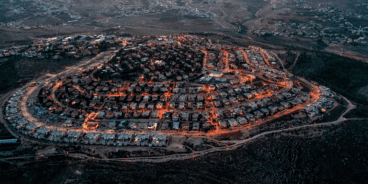
Atrocity Alert No. 64: Venezuela, Israel and the Occupied Palestinian Territories, and Central African Republic
Atrocity Alert is a weekly publication by the Global Centre for the Responsibility to Protect highlighting situations where populations are at risk of, or are enduring, mass atrocity crimes.
Venezuela
Another 48-hour general strike began in Venezuela on Wednesday, 26 July, as the country’s political crisis reaches a tipping point. Four months of mass anti-government demonstrations have been met with deadly and excessive force by national security forces, who have also mobilized civilian “colectivos” as an auxiliary militia to help clear protestors from the streets. More than 100 people, including demonstrators and members of the security forces, have been killed in street violence since April.
Tensions are especially high as a controversial vote to elect a Constituent Assembly takes place this Sunday, 30 July. President Nicolas Maduro has called for the creation of a Constituent Assembly with the power to rewrite Venezuela’s 1999 constitution and supersede other institutions, including the legislature.
Widespread discontent with the government has also been fueled by a severe economic crisis that has resulted in extreme shortages of food, medicine and other essential goods. President Maduro’s response has been to blame both domestic and international enemies, and to use extremist rhetoric to mobilize the government’s core supporters. State repression has created an increasingly violent and volatile situation that imperils the lives of ordinary Venezuelans and threatens the stability of the region. Meanwhile, the political opposition appears increasingly unable to control the actions of mainly young protestors who are now engaged in daily street battles with the security forces across the country.
As Sunday’s vote approaches, it is still within President Maduro’s capacity to de-escalate tensions and end the political crisis. But that will require negotiating with the opposition and engaging with international partners, especially the Organization of American States (OAS). The government must uphold its responsibility to protect all Venezuelans, regardless of their political affiliation, and end systematic human rights abuses.
Israel and the Occupied Palestinian Territories
Since mid-July there has been an escalation of violence in Israel and the Occupied Palestinian Territories, most notably around the Holy Esplanade in Jerusalem, a site sacred to both Muslims and Jews. Following the 14 July fatal attack on two Israeli police officers at Haram al-Sharif – also known as the Temple Mount – Israeli authorities implemented a series of security measures, including the installation of metal detectors and security cameras.
This decision triggered largely peaceful mass protests across East Jerusalem, but there was also an increase in violent clashes between Palestinians and Israeli security forces over the following days. The Israeli security forces have used disproportionate force to disperse protestors, including firing stun grenades and rubber bullets. More than 1,000 Palestinians have been seriously injured.
On 21 July Palestinian President Mahmoud Abbas ordered an end to all political contact with Israel while the new security measures remain in place. Israeli authorities removed the metal detectors on 25 July, but other security measures and the protests continue. The UN’s Middle East envoy has said the ongoing crisis could have “potential catastrophic costs well beyond the walls of the Old City.”
The recent violence in Jerusalem comes in the midst of a political impasse between Israel and the Palestinian Authority regarding the long-stalled peace process. Despite the adoption of UN Security Council Resolution 2334 on 23 December 2016, which reaffirmed that Israeli settlements in the Occupied Palestinian Territories constitute a flagrant violation of international law, there has been a substantial increase in the construction and expansion of illegal settlements in the West Bank.
As protests and sporadic clashes continue in Jerusalem, it is essential that both Israel and the Palestinian Authority condemn anti-Semitic and anti-Palestinian hate speech and incitement to violence. The sanctity of all holy sites must be respected and protected. The international community should push for a lasting political solution, strict adherence to international law and the protection of human rights for all Israelis and Palestinians.
Central African Republic
The precarious security situation in the south east of the Central African Republic (CAR) continues to deteriorate. On 21 July members of an anti-balaka militia attempted to attack the cathedral in Bangassou, which is providing refuge for hundreds of Muslims displaced by earlier violence.
Between 12-14 May attacks by the anti-balaka in Bangassou killed at least 115 people and displaced around 19,000. During the 21 July attacks, civilians were again targeted, houses burnt down and the compounds of humanitarian organizations were looted. The UN children’s agency (UNICEF) has also warned that since May armed groups have committed an increasing number of attacks against children throughout CAR, including murders, abductions, rape and recruitment. The anti-balaka and other armed groups frequently target children during raids on villages.
On 23 July a local anti-balaka militia ambushed members of the UN peacekeeping mission (MINUSCA) who were accompanying a water truck back to Bangassou, killing one peacekeeper. Two more peacekeepers were killed in a similar incident outside Bangassou on 25 July.
Despite recent casualties, MINUSCA must ensure that the protection of civilians remains the mission’s key operational priority. Atrocities committed against civilians, humanitarian workers and peacekeepers must be urgently addressed through the Special Criminal Court for CAR and the International Criminal Court.
Related Publications


Atrocity Alert No. 403: Israel and the Occupied Palestinian Territory, Sudan and the UN Human Rights Council
